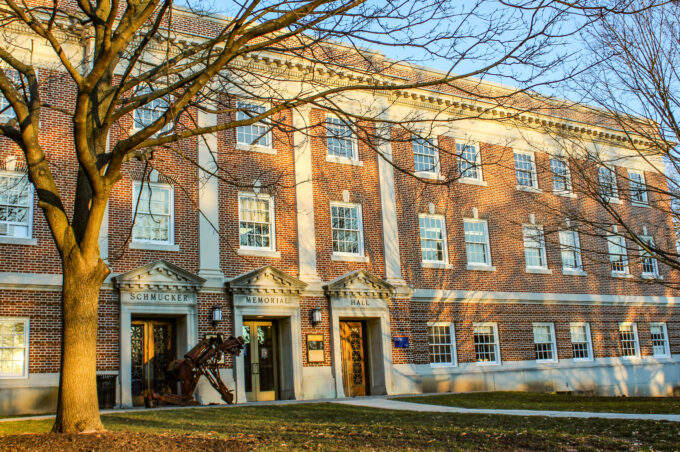Review: Wind Symphony’s “The Automatic Earth”
By Noelle Muni, Staff Writer
On Saturday Nov. 20, the Sunderman Conservatory Wind Symphony presented “The Automatic Earth” under the direction of conductor Russell McCutcheon.
The stage was transformed from its usual state, the musicians completely surrounded by what appeared to be wooden panels not just to the sides, but above them as well. Wordlessly, Dr. McCutcheon took his place, and the concert began its opening number, “Angels in the Architecture.” According to composer Frank Ticheli, “Angels in the Architecture” “unfolds as a dramatic conflict between the two extremes of human existence: one divine, the other evil.”
The song began with a feature of soprano vocalist Dr. Susan Hochmiller, who represented an angel, a bringer of light in the story. Standing in the back of the theatre beneath a makeshift spotlight on the balcony, her melodic voice framed the piece, surrounding the “darkness” of the “face-paced, turbulent” orchestrations. The piece ended where it began, with Hochmiller’s dulcet tones filling the theatre, though ominous chords reverberated beneath her, giving the impression that this battle wasn’t over for good.
The concert’s second piece, “The Automatic Earth” Gettysburg Consortium Premiere composed by Steven Bryant, was initially scheduled for April of 2020, but delayed because, as Dr. McCutcheon dryly put it, “in March of 2020 something happened, and here we are.” The wait, however, was well worth it.
The song opened with overlapping recordings of commentary on the current climate crisis and on the development of technology and Artificial Intelligence before telling these stories through music. The piece consisted of five parts (A Slow Fire, Days of Miracle and Wonder, Shining of Shadow, The Automatic Earth, The Language of Light) and heavily featured clarinetist Chloe Dougherty ’22. The song also utilized some electronics in its sound that provided a dystopian backdrop to the music.
The thing that really set this number apart was its use of lighting. As the song began, the stage became dark, illuminated only by the lights of the stand lamps, providing a somewhat ominous ambient light. Throughout the piece, the lighting changed to match the tone, from deep reds to bright yellows, spotlights through fog and massive flashes reminiscent of lightning as the band roared thunderously beneath it.
“Post-Apocalyptic Blues” followed, composed by Christopher Coleman. Percussionist Eric Gabriel ‘22 stood to the side of the stage, incorporating unorthodox sounds into the piece to bring the post-apocalyptic environment into the piece. Under his command, the sounds of ripping fabric, waving metal sheets, and the crumpling of newspaper were instrumental in and of themselves. Unsurprising for a blues piece, the piece incorporated brief features from nearly every section of the ensemble, making the sound appear to float across the stage like tumbleweeds.
The concert’s final piece, “each moment should be lived fully” composed by Brooke Pierson, was quite different in tone, serving as a goodbye to the graduating seniors of the band. The piece captured a simultaneous sense of yearning for the future and nostalgia for the past. In his description of the piece, Dr. McCutcheon encouraged listeners to enjoy the moments in their lives as they come and know that, as he poignantly put it, “We’ve still got each other, we’ve still got all of you seniors, and we’re going to treasure each moment fully.”

